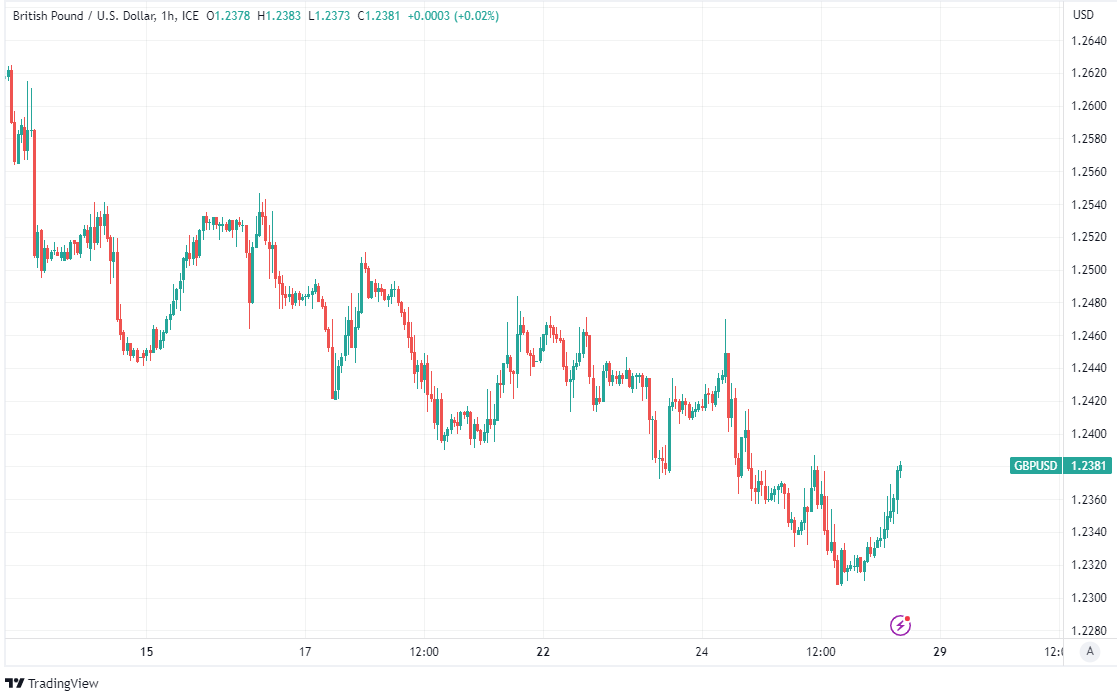GBP/USD Rate Could Have Difficulty if UK Economic Data Holds Up
- Written by: James Skinner
-
"We have become more neutral on the outlook for GBP after being bullish since the start of the year" - MUFG.

Image © Adobe Images
The Pound to Dollar exchange rate climbed from earlier lows in the final session of the week but its recovery could be limited if UK economic data encourages financial markets to maintain their sharply increased expectations for the Bank of England (BoE) Bank Rate.
Sterling climbed against a broadly softer Dollar on Friday and with the help of an April retail sales report suggesting spending on the UK high street had grown faster than was expected by economists last month, although the tentative rebound could be on borrowed time already.
Dollars were sold widely amid reports suggesting an agreement to raise the U.S. government debt ceiling for a period of two years is almost in hand but for Sterling the rub stems from inflation figures out earlier in the week and the sharp resulting increase in implied expectations for the BoE Bank Rate.
"We have raised our forecasts with headline CPI inflation now not expected to drop below 4% until early next year (from our previous view that UK CPI inflation would be on a ‘3’ handle by the end of 2023," says Nikesh Sawjani, a senior economist at Lloyds Commercial Banking.

"Still, the latest Ofgem energy price cap announcement means that electricity and gas prices combined will fall by around 17% in July, while the latest energy futures prices indicate that a further small fall is likely in October too," he adds.
The main UK inflation rate was slower in falling last month than a vast majority of forecasters had expected while the more important core inflation rate rose 6.3% to 6.8% when it had been expected to fall in what was a potentially troublesome development for the BoE and UK economy.
Expectations implied in the interest rate derivative market leaped in the suggestion of a high probability of Bank Rate being lifted a further 100 basis points to 5.5% this year as a result, which dims the outlook for the UK economy and likely has implications for the Pound up ahead.
"We have been fighting that pricing all the way, but if we are seeing some kind of 'positive income shock' from unemployment staying low during a recession, then those higher rate expectations may endure," says Chris Turner, global head of markets and regional head of research for UK & CEE at ING.
Source: Goldman Sachs Marquee.
While the expectation implied in the graph above has not yet actually been delivered by the BoE, and might not be by the time all is said and done, it will have an immediate monetary tightening effect on the UK economy.
This is because residential mortgage lending rates are priced off, or based on the rates set in the overnight-index-swap market and not the level of Bank Rate, which means borrowers will see the 5.5% lending rate passed on immediately as fixed-rate mortgages are reset.
"The MPC remains committed to bringing inflation sustainably back to the 2% target, and that is what we will do. But to do this, further increases in Bank rate cannot be ruled out," the BoE's Damian Haskel, a member of the Monetary Policy Committee, said in a Thursday speech.
The Pound could yet benefit from anything that leads the Dollar lower and might even rise if UK economic data holds up but the danger is of positive economic figures will simply be viewed as making a 5.5% Bank Rate more likely to materialise.
"We have become more neutral on the outlook for GBP after being bullish since the start of the year. Rate hike expectations are supportive but that could give way at some stage if UK inflation is viewed as more problematic and growth expectations worsen," says Derek Halpenny, EMEA head of research at MUFG.
At least, any continued economic resilience would only encourage financial markets to maintain the assumption that Bank Rate will eventually be lifted to the envisaged lofty levels, and the risk is of this leading investors to bet against the Pound or otherwise avoid buying it.
Conversely, Sterling might reverse some of its recent losses in response to anything that leads to interest rate expectations and bond yields being reduced.
"An aggressive response from markets reflects the fact that inflation has come in well above the BoE's forecast for three successive months. Indeed, the latest upside surprise came after the BoE had significantly increased its near-term projections," says Andrew Goodwin, chief UK economist at Oxford Economics.
Above: Contributions to UK inflation rate. Source: Office for National Statistics.
"But the outlook for the latter part of this year and into 2024 is looking increasingly concerning. Our modelling suggests that this is the period when the maximum impact of past monetary tightening will bear down on activity," Goodwin writes in a Friday research briefing.
All of this means UK economic figures are likely to be of heightened importance in the weeks and months ahead, although fortunately for the Pound, there is a number of reasons why inflation could yet surprise on the downside of the forecast upgrades that followed Wednesday's data.
A planned reduction in the household energy bill price cap is one source of likely downward pressure on the inflation rate, although the prospect of price declines in for prices of items in other categories such as communications and, potentially, also the food category.
In addition, communications prices - phone tariffs and broadband - more than doubled in April but price increases in that category tend to be once yearly affair, while the same is true of regulated price items like alcohol and tobacco.

